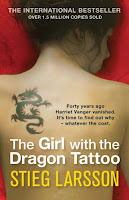 |
| Don't read this... |
The same cannot be said about a series of books which can lay claim to being the 'original' Scandinavian noir, and which are vastly superior in quality and complexity to the more recent novels. These are the Martin Beck novels, a series of ten procedural crime stories written between 1965 and 1975 by the husband and wife team Maj Sjowall and Per Wahloo. These are little known now, though they were popular at the time they were published - and one (the Laughing Policeman) was even made into an American film set in San Francisco and starring Walter Matthau in 1973 (though I have not seen it).
| Read this instead! |
There are a number of remarkable things about these novels. The first is that they were written by Sjowall and Wahloo together - apparently writing alternating chapters (see the description of the process here in an interview with Sjowall). Their achievement is that it is not possible to see the gaps as the style is genuinely seamless. Second, the whole series was plotted from the start, conceived as a series of books that would have an underlying theme ('The Story of a Crime') and in which the character lives would develop. The books are essentially police procedurals, where the detectives and the interaction between them was central to the plot. There is thus a real interest in character, not only the lead detective but in the lives of the others who make up the team. And finally there was the distinct Marxist or left wing sensibility that pervades the novels. According to Wahlöö, their intention was to "use the crime novel as a scalpel cutting open the belly of the ideological, pauperized, and morally debatable so-called welfare state of the bourgeois type." This comes through in the underlying theme of 'the Story of the Crime', where the crime was ultimately conceived of as the poverty, criminality and brutality that underlay the Welfare State - and to give some indication of where they thought the system was heading. (Interestingly this theme also comes through to some extent in Mankell's Wallander novels, concerned as they are with such things as the pressures of immigration and organised crime on the Swedish model). This critique is sometimes a bit formulaic, but at other places offers genuine insight into the the relationship between criminal law and the welfare state.
Above all else, though, they are excellent crime stories, entertaining and well written, and worth reading for that reason alone.
[The books were reissued by Hodder & Stoughton in 2007 and seem to be available on Amazon]

No comments:
Post a Comment